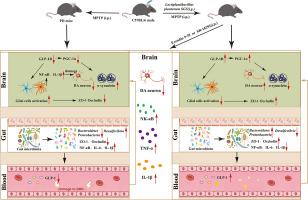Lactiplantibacillus plantarum SG5 inhibits neuroinflammation in MPTP-induced PD mice through GLP-1/PGC-1α pathway
IF 4.6
2区 医学
Q1 NEUROSCIENCES
引用次数: 0
Abstract
Mounting evidence suggests that alterations in gut microbial composition play an active role in the pathogenesis of Parkinson's disease (PD). Probiotics are believed to modulate gut microbiota, potentially influencing PD development through the microbiota-gut-brain axis. However, the potential beneficial effects of Lactiplantibacillus plantarum SG5 (formerly known as Lactobacillus plantarum, abbreviated as L. plantarum) on PD and its underlying mechanisms remain unclear. In this study, we employed immunofluorescence, Western blotting, ELISA, and 16S rRNA gene sequencing to investigate the neuroprotective effects of L. plantarum SG5 against neuroinflammation in an MPTP-induced PD model and to explore the underlying mechanisms. Our results demonstrated that L. plantarum SG5 ameliorated MPTP-induced motor deficits, dopaminergic neuron loss, and elevated α-synuclein protein levels. Furthermore, SG5 inhibited MPTP-triggered overactivation of microglia and astrocytes in the substantia nigra (SN), attenuated disruption of both blood-brain and intestinal barriers, and suppressed the release of inflammatory factors in the colon and SN. Notably, SG5 modulated the composition and structure of the gut microbiota in mice. The MPTP-induced decrease in colonic GLP-1 secretion was reversed by SG5 treatment, accompanied by increased expression of GLP-1R and PGC-1α in the SN. Importantly, the GLP-1R antagonist Exendin 9–39 and PGC-1α inhibitor SR18292 attenuated the protective effects of SG5 in PD mice. In conclusion, we demonstrate a neuroprotective role of L. plantarum SG5 in the MPTP-induced PD mouse model, which likely involves modulation of the gut microbiota and, significantly, the GLP-1/PGC-1α signaling pathway.

植物乳杆菌SG5通过GLP-1/PGC-1α途径抑制MPTP诱导的帕金森病小鼠的神经炎症。
越来越多的证据表明,肠道微生物组成的改变在帕金森病(PD)的发病机制中发挥着积极作用。益生菌被认为可以调节肠道微生物群,通过微生物群-肠道-脑轴对帕金森病的发展产生潜在影响。然而,植物乳杆菌 SG5(原名植物乳杆菌,缩写为 L.plantarum)对帕金森病的潜在有益作用及其内在机制仍不清楚。在本研究中,我们采用免疫荧光、Western 印迹、ELISA 和 16S rRNA 基因测序等方法,研究了植物乳杆菌 SG5 在 MPTP 诱导的帕金森病模型中对神经炎症的神经保护作用,并探讨了其潜在机制。我们的研究结果表明,植物乳杆菌 SG5 可改善 MPTP 诱导的运动障碍、多巴胺能神经元缺失和α-突触核蛋白水平升高。此外,SG5 还能抑制 MPTP 触发的黑质(SN)中小胶质细胞和星形胶质细胞的过度激活,减轻血脑屏障和肠屏障的破坏,并抑制结肠和黑质中炎性因子的释放。值得注意的是,SG5 能调节小鼠肠道微生物群的组成和结构。SG5 可逆转 MPTP 引起的结肠 GLP-1 分泌减少,同时增加 SN 中 GLP-1R 和 PGC-1α 的表达。重要的是,GLP-1R 拮抗剂 Exendin 9-39 和 PGC-1α 抑制剂 SR18292 削弱了 SG5 对 PD 小鼠的保护作用。总之,我们证明了植物乳杆菌 SG5 在 MPTP 诱导的帕金森病小鼠模型中的神经保护作用,这可能涉及到对肠道微生物群的调节,尤其是对 GLP-1/PGC-1α 信号通路的调节。
本文章由计算机程序翻译,如有差异,请以英文原文为准。
求助全文
约1分钟内获得全文
求助全文
来源期刊

Experimental Neurology
医学-神经科学
CiteScore
10.10
自引率
3.80%
发文量
258
审稿时长
42 days
期刊介绍:
Experimental Neurology, a Journal of Neuroscience Research, publishes original research in neuroscience with a particular emphasis on novel findings in neural development, regeneration, plasticity and transplantation. The journal has focused on research concerning basic mechanisms underlying neurological disorders.
 求助内容:
求助内容: 应助结果提醒方式:
应助结果提醒方式:


